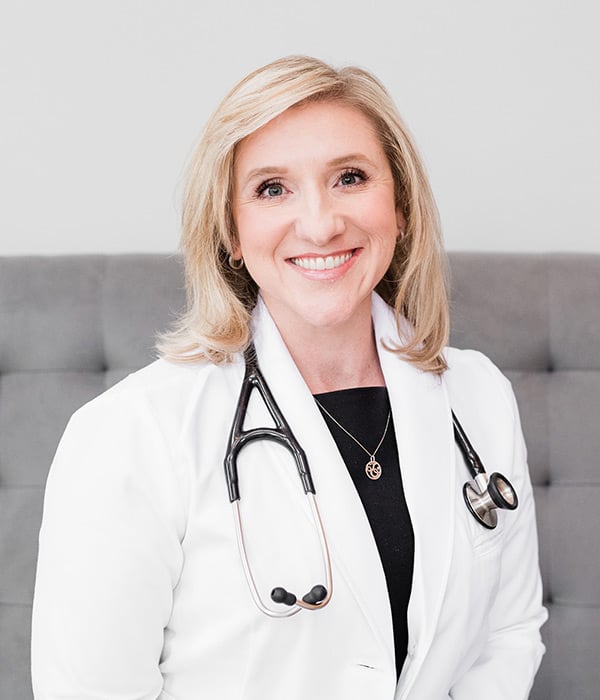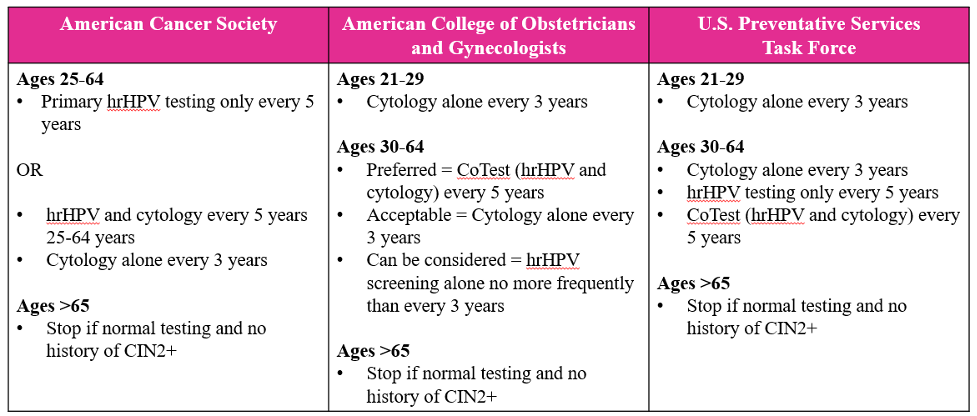
January is Cervical Cancer Awareness Month! With around 13,200 women in the United States diagnosed with cervical cancer each year and more than 4,200 deaths from the disease, we can help offer appropriate vaccinations and screenings as health care providers.
2020 Guidelines from the American Society for Colposcopy and Cervical Pathology (ASCCP).
Follow this guide to help determine what type of testing should be performed and when based on recommendations (colposcopy and treatment vs. surveillance) for risk of CIN 3+:
- Cervical cancer screening should not begin until age 21
- Women <21 years of age should not be screened regardless of the age of sexual debut.
- Screening for ages 21-29
- Cytology alone every three years.
- HPV should not be used as a “screening” tool.
- Screening for ages 30-64
- Cytology + HPV testing (co-testing) every five years is preferred.
- Cytology alone every three years is acceptable.
- When to stop screening
- Stop at age 65 for women with adequate negative prior screening, no CIN2+ within last 20 years.
- Stop after hysterectomy with removal of cervix and no prior history of CIN2+.
- But remember, a pelvic exam should still be performed annually.
- Screening recommendations should not change based on HPV vaccination status.
Need a comparison table?

Speaking about vaccinations
Did you know that the HPV vaccination age limit has changed? Yes, that is right! The 2014 Gardasil 9 valent vaccine is approved for two doses at 0 and 6 months for females and males ages 9-14. And now approved for three doses at 0, 2, and 6 months for females and males ages 15-45. The Gardasil 9 valent vaccine is effective against HPV types 3, 6, 11, 16, 18, 31, 45, 52, 58. So, now it’s your turn to help guide and counsel your patients about receiving a vaccine that can protect them against cancer! Even if your patient has already tested positive for HPV, they can still receive the vaccine as it may help protect them against specific HPV types they have not been exposed to. Talk to your patients (male, female, and everyone in-between) today about getting the HPV vaccine!
Visit the National Cervical Cancer Coalition at www.nccc-online.org, American Sexual Health Association at www.ashasexualhealth.org, or American Society for Colposcopy and Cervical Pathology (ASCCP) at www.asccp.org for more resources.
Skin Bones CME Conferences
Hit the reset button while earning continuing medical education credits at our CME conferences, where you can travel to a vacation destination; earn CME credits with like-minded nurse practitioners, physician assistants, and physicians; and ‘unplug’ while enjoying a new locale! Check out our upcoming Skin, Bones, Hearts & Private Parts 2023 CME Conferences and 2024 CME Conferences! At every event, the best of the medical community gathers to earn CME credits, network, and gain knowledge on dermatology, orthopedics, cardiology and emergency medicine, women’s health, pain management and pharmacology, diabetes, ER, and mental health. On-line CME courses and Virtual CME are also available so you have the option of earning CME credits online.